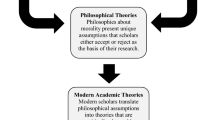Abstract
De George's understanding of theology is limited to one of five commonly recognized models of theology, the orthodox model. This model is vulnerable to De George's criticisms. When religious ethics operates out of the revisionist model of theology, however, his criticisms lose their sting. Revisionist religious ethics, moreover, can make a fruitful contribution to business ethics. Such a religious ethic acknowledges the embodiment dimension of business activities, it complements philosophical analysis with the practice of moral discernment, and it recognizes irony as an active component in decision-making.
Similar content being viewed by others
Author information
Authors and Affiliations
Additional information
John T. Leahy is an Associate Professor of Religious Studies at DePaul University.
Rights and permissions
About this article
Cite this article
Leahy, J.T. Embodied ethics: Some common concerns of religion and business. Journal of Business Ethics 5, 465–472 (1986). https://doi.org/10.1007/BF00380753
Issue Date:
DOI: https://doi.org/10.1007/BF00380753




